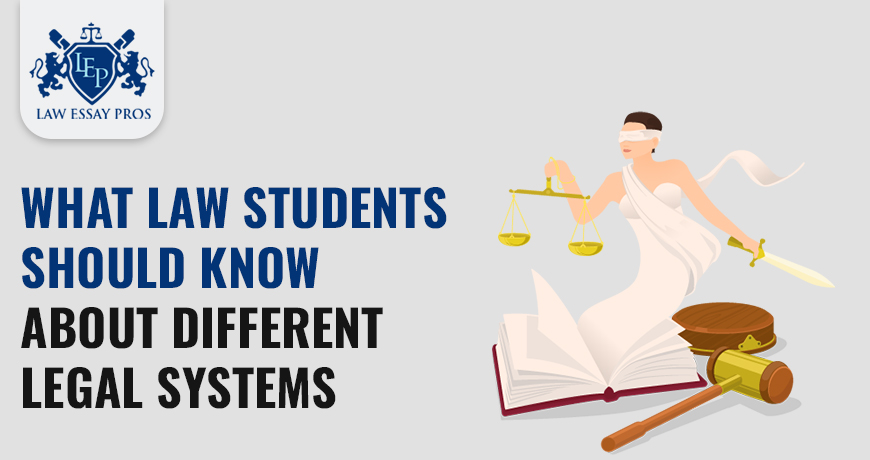
The legal profession is a fusion of diverse traditions, norms, and principles that have evolved over centuries. Mastery of these differences is not merely an academic enterprise for the law student but an essential foundation in a globalized world. This blog looks into what students of law need to know regarding legal systems and why it is relevant for them.
Legal systems are the frameworks through which societies regulate behavior, resolve disputes, and ensure justice. These systems, molded by historical, cultural, and political factors, are never exactly alike. Students need to know about different legal systems so they can be aware of the emerging laws and regulations. They can also get assistance from different professional law dissertation writing services for better performance and guidance on.
Students are taught about major legal systems as a theory in the first two years of law school. To be well learned about these is very crucial as theory and philosophy of law build the basic understanding of students for further specific studies in which different areas/subjects of law are introduced. Students who face difficulty understanding this dry theoretical stuff can acquire law coursework writing and law essay help from authentic resources to affiliate their study process
Major Legal Traditions
There are a few dominant legal systems worldwide, each with particular characteristics. Some of the significant legal traditions that students of law need to be introduced to are as follows:
Common Law System
The essence of the Common Law system lies in the fact that judicial precedents are the conditions that decisions of higher courts bind lower courts within the same jurisdiction. A system followed by England, the United States, Canada, Australia, and India. Even judges are influential agents of the development of law because interpretations of statutes and decisions on individual cases collectively create a body of judicial precedents. The adversarial nature of proceedings, wherein the lawyers for different sides argue with each other while the judge plays a more or less neutral role, is of special significance to this legal system, relying very much upon case law.
Civil Law System
Operating within codified statutes and regulations, the Civil Law system leaves less room for judicial discretion. The system, initially rooted in the laws of Rome, spread across France, Germany, Japan, and Latin America. Laws, being very comprehensive to minute details, cover all three significant aspects of legal areas: civil, criminal, and commercial.
In a civil law system, the judge more often plays the role of investigator, analyzes evidence presented, and uses the written code to decide on a dispute. This approach minimizes the appearance of judicial precedents, and the judges make decisions in absolute accordance with the letter of the law.
Religious Law System
Religious law is that which is based upon sacred texts and spiritual principles. It has formed the basis of various countries' legal systems throughout history. The Sharia, an Islamic code of life, is based upon the Quran and Hadith and forms a significant part of Saudi Arabia, Iran, and Pakistan. For the Jews, the code of Jewish law is known as Halakha, while for the Catholic Church, Canon law is applicable.
Religious law is often inextricably linked with moral precepts, thereby providing a legal system whereby norms of society and spiritual principles govern the practice of the courts. Application ranges widely, from very personal issues, such as marriage and inheritance, to wide-ranging problems in governance.
Customary Law System
Customary law is a form of law that was initially developed from traditional practices and social customs and eventually gained legal status. It is strong in African, Indigenous, and Pacific Islander communities, where the prevailing local customs and traditions in dispute resolution are predominant. Customary law exists alongside formal systems of law, especially in post-colonial states. Though its flexibility allows it to meet changing needs at the level of society, challenges remain in reconciling it with national laws and international human rights standards.
Mixed Legal Systems
Other countries apply mixed systems, combining different legal traditions to solve some unique socio-political contexts. For instance, South Africa applies a mixture of common law, civil law, and customary law, while India applies a mixture of common law and religious law. In a mixed system, what is striven for is a balance in the various strengths of the different legal traditions and their weaknesses to make governance and justice genuinely eclectic. Each legal system carries the stamp of the historical, cultural, and philosophical foundations of the societies within which they are found, and these collectively contribute to the varied tapestry of applications of law worldwide. Understanding them provides another perspective on the administration of justice around the world.
Conclusion
Understanding various legal systems goes beyond academic endeavor, as it becomes an essential tool for coping with the increasing complexities of modern law. The ability to work within different legal traditions makes a lawyer versatile, culturally competent, and truly effective. Whether it involves international law, corporate law, or social justice, this will eventually prepare you for the much-needed contribution to the global legal community. To law students, the journey of exploration into the world's legal systems is not enriching but necessary.